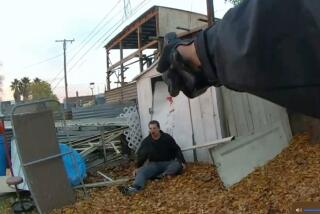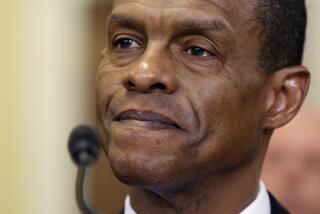The Righteous and the Reprobates
- Share via
Let’s play good cop-bad cop.
Every cop who dies in the line of fire, in the line of duty, becomes a good cop.
Whatever he was in life--a carouser or a drone, a cowboy or a golden boy--he is, by his violent end, automatically elevated into the ranks of the Glorious Dead.
As it happens, Brian Brown was also one of the Glorious Living.
When they mourn over him today, up on the wet, green slopes of Forest Lawn, they will grieve in earnest for a fine fellow, a single father to a 7-year-old boy who on Thursday had to climb on a brown wooden chair, his small face barely visible above the steel bouquet of microphones, to tell the weeping mayor and the wet-eyed reporters what a swell dad he was, what a great cop.
Brian Brown had a fast-track aura about him almost from the moment he joined the LAPD, two days after his 24th birthday. The man who taught tactics in the Marine Corps, who was hit in the leg by an AK-47 round during a six-hour firefight in Somalia, the man who was the best shot in his class, will be carried into church today as the piper plays “When the Battle Is Over.”
There was no battle Sunday night; Brown was killed where he sat, behind the wheel of his black-and-white, shot in the head before he even had time to unbuckle his seat belt. The last thing Brown said, as the fleeing Honda rolled toward the police car and an ex-con named Oscar Zatarain hefted his Ruger assault rifle, was, “There’s going to be a shooting.”
Whatever he was, whatever he could have been, he will be hereafter a gilded name on a marble wall, a memory for conjuring, an icon for a quick whispered prayer: “Please, not me.” And “Please, not again.”
Now for the bad cop part.
The day after Brian Brown died, a jury in San Francisco decided that what happened in San Quentin in March 1994 was bad policing: An inmate was shot and killed by a guard trying to break up a fight among prisoners. The jury put some teeth in its message, ordering the guard to pay $191,000, the warden to pay $450,500, and the man who then headed the Department of Corrections $1.66 million.
In the four years since the San Quentin shooting, The Times found, guards in California prisons killed a dozen inmates and wounded 32 others who were fighting and scuffling. The state’s policy of live ammo to break up serious fights, instead of employing gas or batons or rubber bullets, is unique to California.
Compare that police work to Brown’s: Ten days before he died, he and his rookie partner, on a disturbance call, took down and took into custody--without firing a shot--four gangbangers who each stood about a head taller and 50 pounds heftier than Brown. He came out of it with a bruised knee.
You don’t have to look to San Quentin for bad policing. For a generation, the name Mark Fuhrman will be waved before the LAPD like a red flag. Alan Dershowitz, the Harvard Law School prof and professional bloviator, waved it again this week, in front of the House Judiciary Committee, railing that the committee was ignoring real perjury, like the witness stand lies of police officers that have sent men to prison and even to their deaths.
In almost any trial, jurors are asked whether they will give any special weight to testimony from law enforcement. Most of the time, I suspect, they say what they’re supposed to say: No, they won’t. But they do; we all do. We are not lukewarm about cops. This week we weep with young Dylan Brown over his brave dead dad; next week we may be furious over some new Rodney King-style wrinkle of a simple bust gone amok.
Most professions are embarrassed by their rotten apples. What perturbed L.A. is that, for years, the LAPD always seemed to be hiding its bad apples deeper in the barrel, not chucking them out. Which makes losing a good one all the worse.
*
A memorial to Los Angeles police who died in the line of duty stands outside Parker Center. Another, unveiled three months ago, stands in Westchester at the Police Academy. It bears the names of 186 men and two women of the LAPD, killed in the last 91 years.
On the eve of Brown’s funeral, council member Richard Alarcon, who is about to depart for his new job in the state Senate, unveiled an artist’s sketch for his proposed memorial to the glorious dead. It would be raised in Van Nuys--his district. What politician is going to vote against a police memorial? Perhaps we’ll wind up with one in every council district.
As if, after seeing Dylan Brown’s face, we need reminding.
Patt Morrison’s column appears Wednesdays. She substitutes today for the vacationing Al Martinez. Her e-mail address is patt.morrison@latimes.com.
More to Read
Sign up for Essential California
The most important California stories and recommendations in your inbox every morning.
You may occasionally receive promotional content from the Los Angeles Times.














